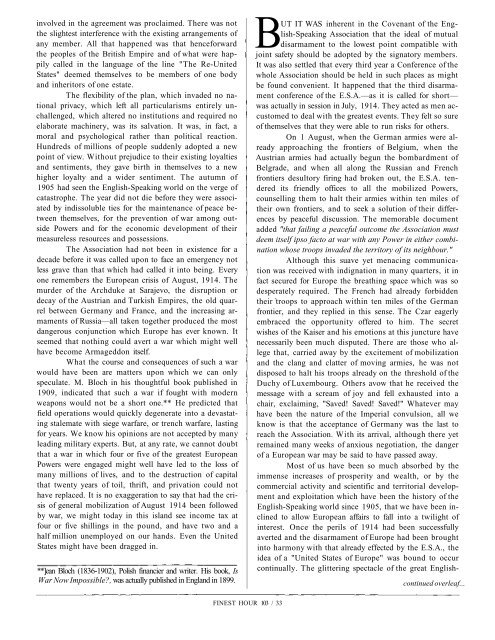.JOURNAL OFTIIE CHURCHILL CKNTER AND ... - Winston Churchill
.JOURNAL OFTIIE CHURCHILL CKNTER AND ... - Winston Churchill
.JOURNAL OFTIIE CHURCHILL CKNTER AND ... - Winston Churchill
- No tags were found...
You also want an ePaper? Increase the reach of your titles
YUMPU automatically turns print PDFs into web optimized ePapers that Google loves.
involved in the agreement was proclaimed. There was notthe slightest interference with the existing arrangements ofany member. All that happened was that henceforwardthe peoples of the British Empire and of what were happilycalled in the language of the line "The Re-UnitedStates" deemed themselves to be members of one bodyand inheritors of one estate.The flexibility of the plan, which invaded no nationalprivacy, which left all particularisms entirely unchallenged,which altered no institutions and required noelaborate machinery, was its salvation. It was, in fact, amoral and psychological rather than political reaction.Hundreds of millions of people suddenly adopted a newpoint of view. Without prejudice to their existing loyaltiesand sentiments, they gave birth in themselves to a newhigher loyalty and a wider sentiment. The autumn of1905 had seen the English-Speaking world on the verge ofcatastrophe. The year did not die before they were associatedby indissoluble ties for the maintenance of peace betweenthemselves, for the prevention of war among outsidePowers and for the economic development of theirmeasureless resources and possessions.The Association had not been in existence for adecade before it was called upon to face an emergency notless grave than that which had called it into being. Everyone remembers the European crisis of August, 1914. Themurder of the Archduke at Sarajevo, the disruption ordecay of the Austrian and Turkish Empires, the old quarrelbetween Germany and France, and the increasing armamentsof Russia—all taken together produced the mostdangerous conjunction which Europe has ever known. Itseemed that nothing could avert a war which might wellhave become Armageddon itself.What the course and consequences of such a warwould have been are matters upon which we can onlyspeculate. M. Bloch in his thoughtful book published in1909, indicated that such a war if fought with modernweapons would not be a short one.** He predicted thatfield operations would quickly degenerate into a devastatingstalemate with siege warfare, or trench warfare, lastingfor years. We know his opinions are not accepted by manyleading military experts. But, at any rate, we cannot doubtthat a war in which four or five of the greatest EuropeanPowers were engaged might well have led to the loss ofmany millions of lives, and to the destruction of capitalthat twenty years of toil, thrift, and privation could nothave replaced. It is no exaggeration to say that had the crisisof general mobilization of August 1914 been followedby war, we might today in this island see income tax atfour or five shillings in the pound, and have two and ahalf million unemployed on our hands. Even the UnitedStates might have been dragged in.**]ean Bloch (1836-1902), Polish financier and writer. His book, IsWar Now Impossible?, was actually published in England in 1899.BUT IT WAS inherent in the Covenant of the English-SpeakingAssociation that the ideal of mutualdisarmament to the lowest point compatible withjoint safety should be adopted by the signatory members.It was also settled that every third year a Conference of thewhole Association should be held in such places as mightbe found convenient. It happened that the third disarmamentconference of the E.S.A.—as it is called for short—was actually in session in July, 1914. They acted as men accustomedto deal with the greatest events. They felt so sureof themselves that they were able to run risks for others.On 1 August, when the German armies were alreadyapproaching the frontiers of Belgium, when theAustrian armies had actually begun the bombardment ofBelgrade, and when all along the Russian and Frenchfrontiers desultory firing had broken out, the E.S.A. tenderedits friendly offices to all the mobilized Powers,counselling them to halt their armies within ten miles oftheir own frontiers, and to seek a solution of their differencesby peaceful discussion. The memorable documentadded "that failing a peaceful outcome the Association mustdeem itself ipso facto at war with any Power in either combinationwhose troops invaded the territory of its neighbour."Although this suave yet menacing communicationwas received with indignation in many quarters, it infact secured for Europe the breathing space which was sodesperately required. The French had already forbiddentheir troops to approach within ten miles of the Germanfrontier, and they replied in this sense. The Czar eagerlyembraced the opportunity offered to him. The secretwishes of the Kaiser and his emotions at this juncture havenecessarily been much disputed. There are those who allegethat, carried away by the excitement of mobilizationand the clang and clatter of moving armies, he was notdisposed to halt his troops already on the threshold of theDuchy of Luxembourg. Others avow that he received themessage with a scream of joy and fell exhausted into achair, exclaiming, "Saved! Saved! Saved!" Whatever mayhave been the nature of the Imperial convulsion, all weknow is that the acceptance of Germany was the last toreach the Association. With its arrival, although there yetremained many weeks of anxious negotiation, the dangerof a European war may be said to have passed away.Most of us have been so much absorbed by theimmense increases of prosperity and wealth, or by thecommercial activity and scientific and territorial developmentand exploitation which have been the history of theEnglish-Speaking world since 1905, that we have been inclinedto allow European affairs to fall into a twilight ofinterest. Once the perils of 1914 had been successfullyaverted and the disarmament of Europe had been broughtinto harmony with that already effected by the E.S.A., theidea of a "United States of Europe" was bound to occurcontinually. The glittering spectacle of the great Englishcontinuedoverleaf...FINEST HOUR 103 / 33

















